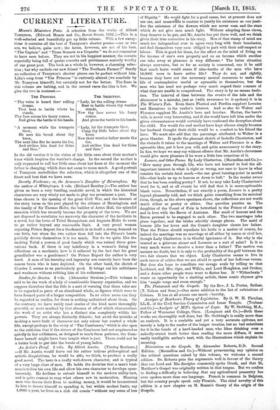An Artist's Proof. 3 vols. By Alfred Austin. (Tinsley Brothers.)
—If Mr. Austin would leave out his rather tedious philosophical and artistic disquisitions, he would be able, we think, to produce a really good novel. The hero is a really well-drawn character, and is typical of a very large class of men. He holds the doctrine that a man's busi- ness is to live his own life and allow his own character to develope spon- taneously. He declines to submit himself to the modern utility-test, and is quite content to reap what others sow in moderation. Blaming men who devote their lives to making money, it would be inconsistent in him to devote himself to spending it, but within modest limits, say 1,0001. a year, he lives on a rich old cousin "without any sense of loss of Dignity." He would fight for a good cause, but at present does not see one, and meanwhile is content to justify his existence as one justi- fies the existence of the flowers which are never seen and the stars which do not give men mach light. Without adopting these views, they deserve to be put, and Mr. Austin has put them well, and we think. given their true corrective in his story. Men of that stamp of mind are much too independent ever to agree very long with their benefactor, and find themselves very soon obliged to part with their self-respect or labour. This is good for them, for the effect on the mind of living on the income of one's own property and on an income which another can take away at pleasure is very different. • The latter situation always enervates, but so far as society is concerned, can it be said that much harm would ensue if nine-tenths of the men who hive 10,0001. were to leave active life ? They do not, and rightly, because they have not the necessary mental resources to make the life of contemplation useful or agreeable to themselves, but the man who has need not perhaps very much regard their censure of what they are unable to comprehend. The story is by no means fault- less. The interval of time between the events of the tale and the dernouement is a mistake, just as (with reverence ba it spoken) it is in. The Winter's Tale. Even there Florizel and Perdita supplant Loontes and Hermione in the reader's interest. And so also do Walter and Florence supplant Mr. Austin's hero and heroine. Marian, the hero's wife, is never very interesting, and if she would have left him under the given circumstances would certainly have confessed the deception about the child. Nor would the real mother have kept silence simply because her husband thought their child would be a comfort to his friend the hero. We must also add that the parentage attributed to Walter is a gross blunder. It spoils the pleasant sketch of Isabelle Chesterton, and the obstacle it raises to the marriage of Walter and Florence is a dis- agreeable idea, pat it how you will, and quite unnecessary to the story. In fine, we hope we may say without offence that Mr. Austin's cleverness would give more pleasure if he were a little less conscious of it.






























 Previous page
Previous page